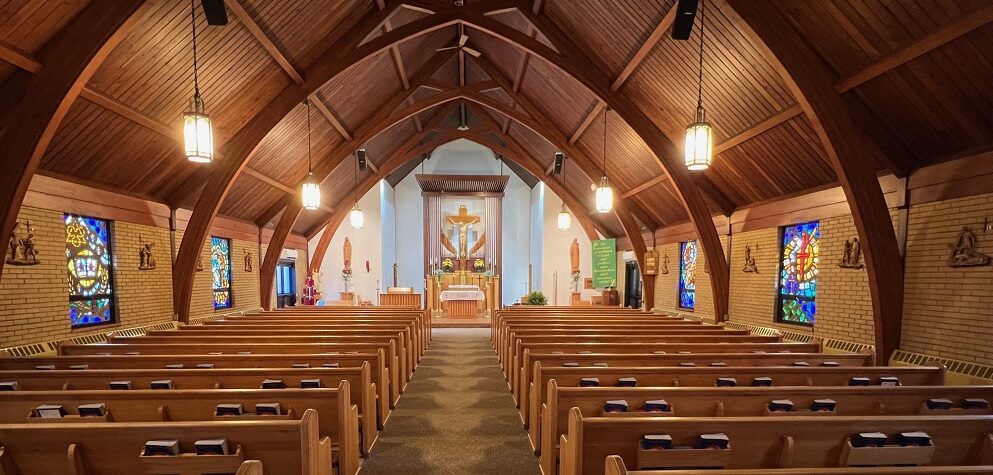The Holy Mass is the central act of worship in the Catholic Church, where believers gather to celebrate the Eucharist. It is a sacred liturgy that commemorates the Last Supper, where Jesus instituted the sacrament of Holy Communion. The Mass consists of two main parts: the Liturgy of the Word and the Liturgy of the Eucharist, each with specific rites and prayers. Through the Mass, Catholics believe they encounter the real presence of Christ in the consecrated bread and wine.
“The Mass is the greatest prayer we can offer.” ― Saint John Vianney
What is the symbolism of the gestures at Mass? | The Mass Explained (3:24)
The Meaning of the Mass
The Catholic Mass is the primary expression of worship for Catholics around the world. It is a communal celebration where the faithful come together to give praise and thanks to God. At its core, the Mass is a re-presentation of Christ’s sacrifice on the cross, made present through the Eucharist. Catholics believe that Jesus established this ritual at the Last Supper, instructing his apostles to continue it in his memory. The Mass is not a new sacrifice but a participation in the one, eternal sacrifice of Christ. This understanding is foundational to Catholic theology and practice. The word “Mass” comes from the Latin Missa, meaning “sending forth,” reflecting the mission of the faithful to live out their faith. It is both a meal and a sacrifice, uniting the community in a shared act of worship. The Mass is offered daily in many churches, though Sunday Mass holds special significance. For Catholics, attending Mass is an opportunity to grow closer to God and receive grace.
“Every holy Mass, heard with devotion, produces in our souls marvelous effects, abundant spiritual and material graces which we, ourselves, do not know. It is easier for the earth to exist without the sun than without the holy sacrifice of the Mass.” ― Saint Padre Pio
Historical Roots of the Mass
The origins of the Mass can be traced back to the earliest Christian communities. In the first century, believers gathered to break bread and share prayers, as described in the Acts of the Apostles (Acts 2:42). These gatherings were influenced by Jewish synagogue practices, including readings from scripture and psalms. Over time, the structure of the Mass took shape, incorporating elements from both Jewish tradition and Christ’s actions at the Last Supper. By the fourth century, the basic framework of the Mass was recognizable, though it continued to evolve. The Council of Trent in the 16th century standardized much of the liturgy to ensure uniformity across the Church. After the Second Vatican Council (1962–1965), the Mass was revised to allow greater use of the vernacular language instead of Latin. Despite these changes, the essential elements have remained intact. The Mass today reflects both ancient traditions and adaptations to modern needs. Its consistency across time and place underscores its importance in Catholic life.
The Mass and Eternal Life
The Mass has a deep connection to the Catholic understanding of salvation and eternal life. It is seen as a foretaste of the heavenly banquet described in scripture (Revelation 19:9). By participating, Catholics believe they are united with Christ’s redemptive work. The Eucharist strengthens them for the challenges of life and prepares them for eternity. The Mass also includes prayers for the dead, reflecting belief in the communion of saints. This link between the living and the departed emphasizes the eternal scope of the liturgy. Each Mass is offered for specific intentions, such as the repose of souls or the needs of the world. It is a source of hope and a reminder of God’s promise. The faithful are encouraged to see the Mass as a bridge to the divine. This perspective gives it profound meaning beyond the present moment.
Prayer in Appreciation of the Mass
O Lord Jesus, in order that the merits of your sacrifice on the Cross might be applied to every soul of all time, you willed that it should be renewed upon the altar. At the Last Supper, you said: “Do this in remembrance of me.” By these words you gave your apostles and their successors the power to consecrate and the command to do what you yourself did. I believe that the Mass is both a sacrifice and a memorial, reenacting your passion, death and resurrection. Help me to realize that the Mass is the greatest gift of God to us and our greatest gift to God. Amen.
